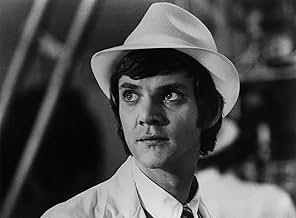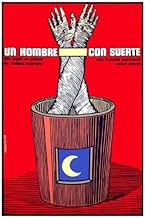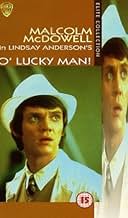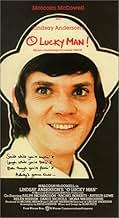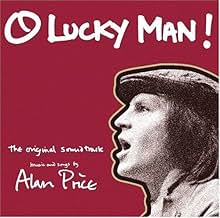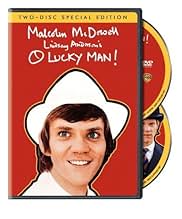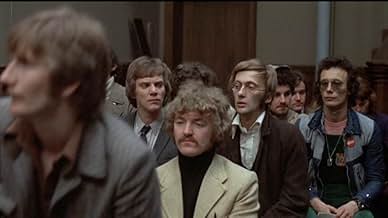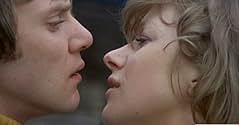IMDb रेटिंग
7.6/10
9.1 हज़ार
आपकी रेटिंग
अपनी भाषा में प्लॉट जोड़ेंAn ambitious coffee salesman has a series of improbable and ironic adventures that seem designed to challenge his naive idealism.An ambitious coffee salesman has a series of improbable and ironic adventures that seem designed to challenge his naive idealism.An ambitious coffee salesman has a series of improbable and ironic adventures that seem designed to challenge his naive idealism.
- निर्देशक
- लेखक
- स्टार
- 2 BAFTA अवार्ड जीते गए
- 3 जीत और कुल 2 नामांकन
Mary MacLeod
- Mary Ball
- (as Mary Macleod)
- …
फ़ीचर्ड समीक्षाएं
A coffee salesman takes a rambling tour of 1970's Britain.
There comes a time when you think you know something about movies: What is good, what is bad, how things should go, how things should work, etc., etc. Thank goodness a movie comes along now and again that says "no you don't - you know nothing!" Oh Lucky Man! is like Pulp Fiction and High Hopes - it is a smarter film than you are a film watcher.
After a build up like that you might expect for me to say that this is a perfect film or that everything works. But it doesn't. The story rambles and pauses, moves left and right and tries to keep the audience on its toes. The humour is mostly black, but very true to life. People are often selfish and acting for themselves - while Travis (our hero - if we can call him that) is quite kind and thoughtful. Like an Adam that has been put in to the modern world rather than the garden of Eden.
I have seen this film twice. Like many films, once when I was too young to understand it. It is quite sexual graphic at times and that stuck in my memory for a long time. In one scene a black man plays out a scene at a sex club - and to this day I am puzzled as to what this represents. That the entirely white audience see the black as an entertainer to laughed at or cheered. That this is his only place?
Most anything-goes films are comedies, and while this has plenty of black comedy, I see it as social comment. Life has moved on from the 1970's, people have escaped their own class more, women have more of a role to play, people get away with things less. But no one can say - even viewing today - that it doesn't tell plenty of home truths about the UK.
(People that live outside the UK and never visit must be puzzled by what goes on here. I bet you would have to answer hundreds of questions if you watched it beside, say, an American.)
Lindsey Anderson sees all authority as being violent, ugly and corrupt. This is the kick in the balls society that existed before CCTV in police stations and human rights acts. Where people were fitted up for crimes that the police knew they couldn't have committed. I never wanted to walk down a time tunnel to 1970's Britain and this film is probably the last tie I have to that ugly and desperate decade.
Oh Lucky Man! is one of the best films ever made. It has something that few films ever have - instant cult appeal. You could watch this over and over again and not get bored with it, see something different and learn something new. They should bring it back as a musical or a stage play. While not every scene works and not every tune pleases, it is cinema from another world that we never quite had - but might have had if only the money men of Hollywood hadn't made their ugly mark on the world.
If you think film is about anything more than simple entertainment Oh Lucky Man! is a must-see...
There comes a time when you think you know something about movies: What is good, what is bad, how things should go, how things should work, etc., etc. Thank goodness a movie comes along now and again that says "no you don't - you know nothing!" Oh Lucky Man! is like Pulp Fiction and High Hopes - it is a smarter film than you are a film watcher.
After a build up like that you might expect for me to say that this is a perfect film or that everything works. But it doesn't. The story rambles and pauses, moves left and right and tries to keep the audience on its toes. The humour is mostly black, but very true to life. People are often selfish and acting for themselves - while Travis (our hero - if we can call him that) is quite kind and thoughtful. Like an Adam that has been put in to the modern world rather than the garden of Eden.
I have seen this film twice. Like many films, once when I was too young to understand it. It is quite sexual graphic at times and that stuck in my memory for a long time. In one scene a black man plays out a scene at a sex club - and to this day I am puzzled as to what this represents. That the entirely white audience see the black as an entertainer to laughed at or cheered. That this is his only place?
Most anything-goes films are comedies, and while this has plenty of black comedy, I see it as social comment. Life has moved on from the 1970's, people have escaped their own class more, women have more of a role to play, people get away with things less. But no one can say - even viewing today - that it doesn't tell plenty of home truths about the UK.
(People that live outside the UK and never visit must be puzzled by what goes on here. I bet you would have to answer hundreds of questions if you watched it beside, say, an American.)
Lindsey Anderson sees all authority as being violent, ugly and corrupt. This is the kick in the balls society that existed before CCTV in police stations and human rights acts. Where people were fitted up for crimes that the police knew they couldn't have committed. I never wanted to walk down a time tunnel to 1970's Britain and this film is probably the last tie I have to that ugly and desperate decade.
Oh Lucky Man! is one of the best films ever made. It has something that few films ever have - instant cult appeal. You could watch this over and over again and not get bored with it, see something different and learn something new. They should bring it back as a musical or a stage play. While not every scene works and not every tune pleases, it is cinema from another world that we never quite had - but might have had if only the money men of Hollywood hadn't made their ugly mark on the world.
If you think film is about anything more than simple entertainment Oh Lucky Man! is a must-see...
I have seen both versions (there was an edited version in the late seventees that did not include the rescue scene) of "O Lucky Man" several times. I first saw it in London in the mid seventees as I was very impressed by Lindsay Andersons earlier "If", not to mention a fine performance by Malcolm McDowell. The surreal quality of of Andersons allegorical perspective of life in England at the time was reflected in one of the films great lines, "Try not to die like a dog?" Having seen the film several times since (and turned some friends onto Lindsey Anderson), I was truly surprised at how this film has, not only, not dated, but actually has more relevance now than it did some 27 years ago. England, was about to undergo radical changes in both government and economy. The naivety of the care free sixties was well behind us. Major strikes were frequent. Punk was about to explode onto an exhausted music scene. And, soon there would be a new regime of economic rationalists running the country. The mood and pace of "O Lucky Man" seemed to reflect a sense of innocence lost. Troubled times ahead. A sense of fear and mistrust of the prosperity that is so often associated with capitalism and free enterprise. There are even blatant stabs at genetic engineering. But most of all the sense that England was no longer in control of it's own destiny. Through out this vision of uncertainty are some of last centuries finest comic performances. Most notably Aurthur Lowes' 'Dr. Munda' was, and still is, brilliant. WARNING!!! Even though this film does not follow the normal codes and conventions of narrative structure, my next comment is about a scene towards the end of the film. So, if you have not seen "O Lucky Man", but would like to, stop reading now. The best line of all that sums up the mood of this film is delivered by Mick Travis during the audition scene. After being slapped in the face by Lindsay Anderson when he was told to 'smile', he looks straight at the camera, sneers, and says, "What's there to smile about?". All these years later, still brilliant.
It's always nice to find a worthy film after being a movie watcher for three decades. I remember when this movie was in the theaters. I was a teenager then and didn't go see it. I decided to watch the video and was immediately drawn into this surreal Bunuelish kind of British made movie. Malcolm McDowell is superb as the forever optimistic young coffee salesman. No matter what happens to him, he keeps his good attitude. Don't miss it! But, don't expect absolute narrative
This is simply one of my favorite films, and shows that just because the studio system was long dead by the 1970's, that doesn't mean that there aren't plenty of worthwhile classics from that decade and beyond. This movie is unique, and yet to watch it is to see something that was very typical of films in the early 1970's - film trying to reflect in some way upon the world as it exists or is heading. Then came CGI and the cartoonish escapist fantasies that comprise the vast number of films we have today. This film really requires multiple viewings to get it. It basically follows the moral journey of an initially smiling coffee salesman (Malcolm McDowell) as he has his ideals smashed one by one. McDowell was himself a coffee salesman as a young man, and the whole film is from an original idea and script of his very own. I think it does a perfect job of describing the 1970's, which was basically a bridge decade between the idealistic 1960's and the "If it doesn't contribute to the bottom line then it's expendable" mode of thinking that began in the 1980's and just gets more entrenched as time passes. This film isn't for everyone, and although the two movies have completely different story lines, I'd say if you liked "Harold and Maude" you'll like this one too.
10miloc
This remarkable, often overlooked film deserves a higher critical reputation than it has largely received. It represents a blossoming of the themes introduced in "if..." (the previous film in Anderson's trilogy) and a playful, even strangely upbeat reworking of those ideas.
"if..." was an explosion of the subconscious, repression fermenting into fantasized revolution; in "O Lucky Man!" the repression has matured into deep, abiding social, political, and economic corruption-- but the fantasies have matured as well. Mick Travis's journey through early '70s England features calamity after calamity, atrocity piled onto atrocity, but it feels lighter than air. It rises like a joke-filled balloon. That vantage point gives the viewer the two advantages unavailable to Travis: wisdom and perspective, and the film's humor comes from the distance between us and the characters scurrying below. (But the film is not, I think, cynical; the road to enlightenment may be hard one but the film makes it clear that it's not unreachable.)
Surrounding Malcolm McDowell's indefatigable Candide of a hero, the supporting cast flows in and out of their multiple roles like a comic repertory company, in which the same actors show up in scene after scene shuffled into a new assortment of scoundrels, con-artists, victims and sages, climaxing (don't worry, I'm not going to spoil it) in a beautiful, subtle joke which has to be seen to be understood.
From the silent-movie pastiches through Price's terrific songs (the music is used admirably) through wild, spontaneous moments of parody, uninhibited symbolic flourishes, and a few small scenes of genuine poignancy, "O Lucky Man!" deserves to be recognized as one of the great films of the 1970s, and perhaps of all time. It's certainly one of my personal favorites. Movies, I think, though bigger than ever, have become smaller and smaller at heart; more films should have the ambitions this film does and deliver on so many of them.
"if..." was an explosion of the subconscious, repression fermenting into fantasized revolution; in "O Lucky Man!" the repression has matured into deep, abiding social, political, and economic corruption-- but the fantasies have matured as well. Mick Travis's journey through early '70s England features calamity after calamity, atrocity piled onto atrocity, but it feels lighter than air. It rises like a joke-filled balloon. That vantage point gives the viewer the two advantages unavailable to Travis: wisdom and perspective, and the film's humor comes from the distance between us and the characters scurrying below. (But the film is not, I think, cynical; the road to enlightenment may be hard one but the film makes it clear that it's not unreachable.)
Surrounding Malcolm McDowell's indefatigable Candide of a hero, the supporting cast flows in and out of their multiple roles like a comic repertory company, in which the same actors show up in scene after scene shuffled into a new assortment of scoundrels, con-artists, victims and sages, climaxing (don't worry, I'm not going to spoil it) in a beautiful, subtle joke which has to be seen to be understood.
From the silent-movie pastiches through Price's terrific songs (the music is used admirably) through wild, spontaneous moments of parody, uninhibited symbolic flourishes, and a few small scenes of genuine poignancy, "O Lucky Man!" deserves to be recognized as one of the great films of the 1970s, and perhaps of all time. It's certainly one of my personal favorites. Movies, I think, though bigger than ever, have become smaller and smaller at heart; more films should have the ambitions this film does and deliver on so many of them.
क्या आपको पता है
- ट्रिवियाAfter the success of If.... (1968), Malcolm McDowell suggested to producer and director Lindsay Anderson that they should work again. Anderson replied that good scripts don't grow on trees, and that McDowell should consider writing his own if he wanted to give himself a good part. Although McDowell was only thirty at the time, he based this movie around the concept of his own life story, and then brought it to David Sherwin, who then crafted the screenplay.
- गूफ़A sign says 200 miles to London where Travis is picked up. He has reached there by walking for a while from the military establishment where the explosion took place. The distance even from London to the border of Scotland is 398 Miles.
- इसके अलावा अन्य वर्जनThe original US release was cut by twenty or more minutes, the entire sequence involving the suicidal woman, roughly from Mick's release from prison until he meets the charity tea-wagon lady was omitted. (This included one of Alan Price's songs)
- कनेक्शनFeatured in Free Cinema (1986)
- साउंडट्रैकO Lucky Man!
Written by Alan Price
टॉप पसंद
रेटिंग देने के लिए साइन-इन करें और वैयक्तिकृत सुझावों के लिए वॉचलिस्ट करें
- How long is O Lucky Man!?Alexa द्वारा संचालित
विवरण
- रिलीज़ की तारीख़
- कंट्री ऑफ़ ओरिजिन
- भाषा
- इस रूप में भी जाना जाता है
- Der Erfolgreiche
- फ़िल्माने की जगहें
- उत्पादन कंपनियां
- IMDbPro पर और कंपनी क्रेडिट देखें
बॉक्स ऑफ़िस
- दुनिया भर में सकल
- $332
- चलने की अवधि2 घंटे 58 मिनट
- ध्वनि मिश्रण
- पक्ष अनुपात
- 1.85 : 1
इस पेज में योगदान दें
किसी बदलाव का सुझाव दें या अनुपलब्ध कॉन्टेंट जोड़ें



